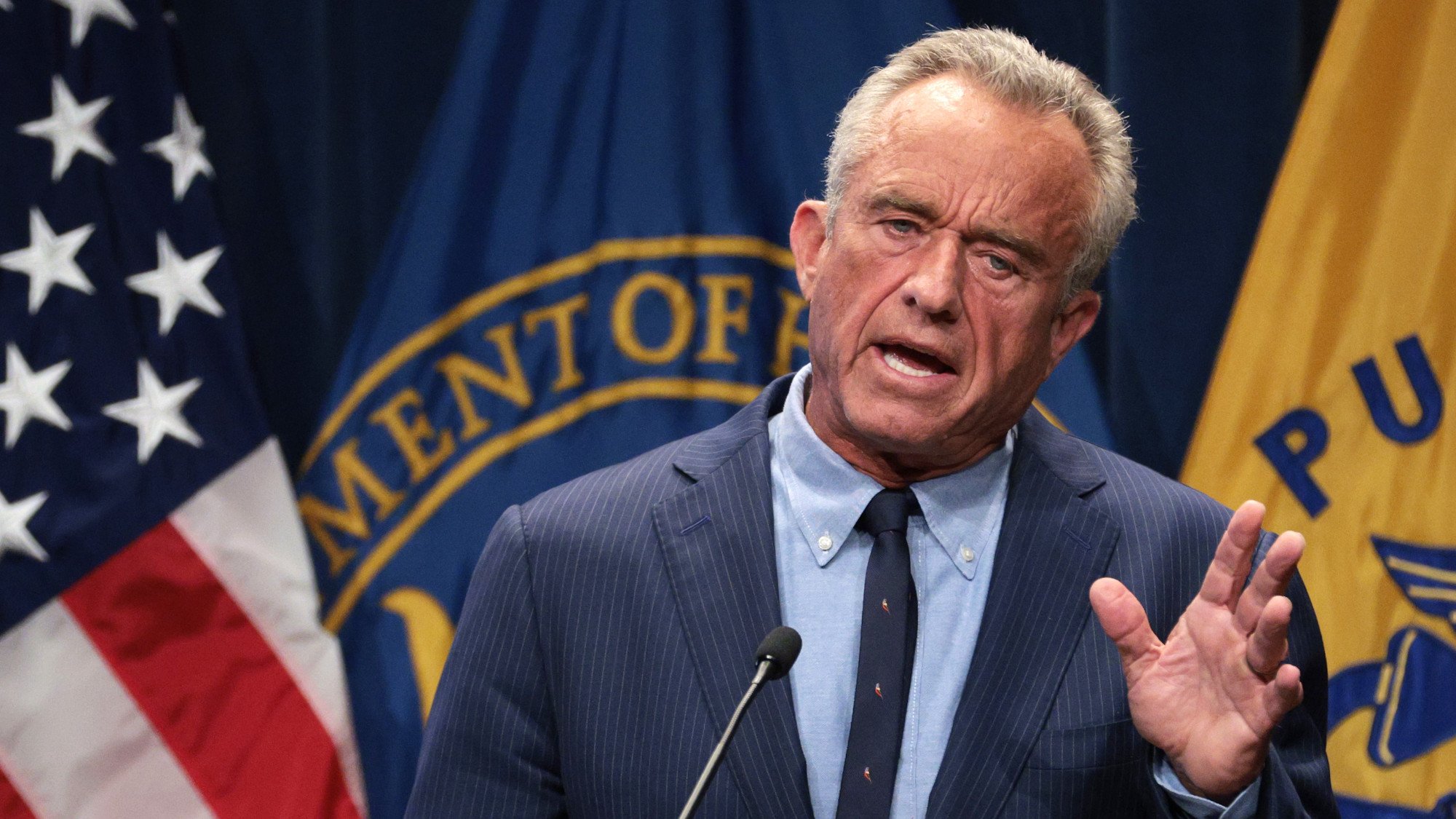Pennsylvania's Fetterman, ableism, and NBC
A controversial interview has sparked a conversation about ableism in politics. Can Fetterman overcome?


A free daily email with the biggest news stories of the day – and the best features from TheWeek.com
You are now subscribed
Your newsletter sign-up was successful
On Tuesday, NBC News aired an interview with Pennsylvania's Democratic Senate candidate John Fetterman featuring journalist Dasha Burns. Burns' comments before the interview, and the focus on Fetterman's health, sparked accusations of ableism against Burns and the network. Here's everything you need to know about the controversy swirling around the interview, as well as the state of Fetterman's health and how it might impact the outcome of the race.
What was the interview about?
Just before Pennsylvania's primary in May, Democratic frontrunner John Fetterman, a tall and lanky politician whose idiosyncratic mannerisms and hoodie-and-shorts dress code made him an outlier in contemporary politics, had a stroke. Since his recovery, Fetterman has kept a light schedule, especially for a major party candidate in a race that could decide partisan control of the Senate. Fetterman has also not agreed to debate his opponent, Republican Mehmet Oz.
NBC's Dasha Burns sat down with Fetterman in an interview that aired Tuesday, mostly to discuss his health and how it might affect the election. Before the interview aired, Burns told anchor Lester Holt that she didn't think Fetterman understood her when they were making small talk before taping. The Democrat also asked to be able to read her questions on closed captioning during the interview so that he could better understand Burns' questions. Since the stroke, Fetterman has had some difficulty with "auditory processing and word retrieval." At times during the interview, he struggled to reach for the right word or phrase.
The Week
Escape your echo chamber. Get the facts behind the news, plus analysis from multiple perspectives.

Sign up for The Week's Free Newsletters
From our morning news briefing to a weekly Good News Newsletter, get the best of The Week delivered directly to your inbox.
From our morning news briefing to a weekly Good News Newsletter, get the best of The Week delivered directly to your inbox.
While some interest in a candidate's health makes sense for such an important position, the way that NBC conducted this interview, and the subsequent focus on whether Fetterman is too disabled to serve in the Senate has sparked accusations of ableism. Others maintain that the people have the right to know about Fetterman's condition and that journalists are merely doing their due diligence by trying to get to the truth.
What is ableism?
In recent years, disability rights activists have worked hard to draw attention to the various ways that people with disabilities face discrimination in American society. That includes semantic pushback like bringing awareness to the dark history of commonly-used epithets like "moron" or bringing attention to how phrases like "confined to a wheelchair" are hurtful. And activists fighting against ableism — which the American Psychological Association defines as "prejudice and discrimination aimed at disabled people, often with a patronizing desire to 'cure' their disability and make them 'normal.'" Ableism takes many forms, including the way people tend to talk about individuals with Autism Spectrum Disorder as damaged and how people use the phrase "on the spectrum" as a derogatory phrase describing anyone with any kind of social eccentricity. What links many of these practices together is the use of the terms for various conditions as ways of insulting people.
There are also more practical aspects of disability discrimination. Survivors of major strokes can be impaired in a variety of ways that may impede their participation in society. From mobility issues to language and cognitive problems, some aftereffects may only dissipate with time, or not at all. That makes Fetterman a person with disabilities, even if he and his team maintain that they expect his symptoms to improve with time. And disability activists are livid at the common assumption that a disability makes someone unfit to serve in the U.S. Senate.
Burns was indeed combative in the interview, pressing Fetterman about whether he would be "fit to serve on day one" and claiming that voters would "have to take your word for it." She has since defended her interview and the purpose behind it. "Our reporting did not and should not comment on fitness for office," she wrote on Twitter. "This is for voters to decide. What we do push for as reporters is transparency. It's our job."
A free daily email with the biggest news stories of the day – and the best features from TheWeek.com
What's really at stake?
For the disability rights community, the point is not whether Burns' line of questioning was or wasn't proper. It's about whether someone who needs closed captioning to fully understand someone's speech should be able to serve in important positions of power and authority. As Eric Buehlmann of the National Disability Rights Network told Buzzfeed, Fetterman's condition "shouldn't be used as a stigmatizing tool, or something that needs to, quote-unquote, disqualify someone from being a senator." After all, prominent past presidents and members of Congress have succeeded in their roles while navigating life as a person with disabilities. MSNBC's Eric Michael Garcia added that Fetterman's experience is one of the reasons people with disabilities often don't seek accommodations, fearing this kind of treatment.
On top of that, "the use of teleprompters or captioning is a common accommodation that is routinely provided for people with and without disabilities," noted Robert Gould, Assistant Clinical Professor of Disability and Human Development at the University of Illinois Chicago to The Week. "There is an all too common and stigmatizing misperception that accommodations are "special" or "unreasonable" when they are made on the basis of disability. This stigma is also one of the biggest barriers to realizing the promise of equal opportunity for people with disabilities."
Fetterman responded to the controversy with a characteristically sardonic tweet. "Recovering from a stroke in public isn't easy," Fetterman wrote. "But in January, I'm going to be much better — and Dr. Oz will still be a fraud." Consciously or not, Fetterman was paraphrasing the late movie critic Roger Ebert, who once told irate film director Vincent Gallo, who called him fat (and much worse) that "It is true that I am fat. But one day I will be thin, and you will still be the director of The Brown Bunny." Ebert famously, and movingly, wrote about the challenges of being disabled in the last years of his life after cancer surgery left him without part of his jaw. Ebert's turn-of-phrase is attributed to Winston Churchill, who served years as Prime Minister of the United Kingdom after suffering from a series of strokes.
Whether Fetterman's condition will affect his lead over Oz remains to be seen. While FiveThirtyEight shows Fetterman with a 6-point lead, there hasn't been a public poll of the race since Sept. 30th — an eternity in political time. Voters might see the pile-on as unseemly and move further toward the Democrat, or they might view his candidacy less favorably, wondering whether his long-term health is in jeopardy. Political scientists Peter John Loewen and Ludovic Rheault found that mental illness and depression could shave as much as 10 points off a candidate's vote share, but that no corresponding effect was found for physical illnesses. So the public's response could depend on how Pennsylvania voters classify his condition.
David Faris is a professor of political science at Roosevelt University and the author of "It's Time to Fight Dirty: How Democrats Can Build a Lasting Majority in American Politics." He's a frequent contributor to Newsweek and Slate, and his work has appeared in The Washington Post, The New Republic and The Nation, among others.
-
 6 of the world’s most accessible destinations
6 of the world’s most accessible destinationsThe Week Recommends Experience all of Berlin, Singapore and Sydney
-
 How the FCC’s ‘equal time’ rule works
How the FCC’s ‘equal time’ rule worksIn the Spotlight The law is at the heart of the Colbert-CBS conflict
-
 What is the endgame in the DHS shutdown?
What is the endgame in the DHS shutdown?Today’s Big Question Democrats want to rein in ICE’s immigration crackdown
-
 The billionaires’ wealth tax: a catastrophe for California?
The billionaires’ wealth tax: a catastrophe for California?Talking Point Peter Thiel and Larry Page preparing to change state residency
-
 Bari Weiss’ ‘60 Minutes’ scandal is about more than one report
Bari Weiss’ ‘60 Minutes’ scandal is about more than one reportIN THE SPOTLIGHT By blocking an approved segment on a controversial prison holding US deportees in El Salvador, the editor-in-chief of CBS News has become the main story
-
 Has Zohran Mamdani shown the Democrats how to win again?
Has Zohran Mamdani shown the Democrats how to win again?Today’s Big Question New York City mayoral election touted as victory for left-wing populists but moderate centrist wins elsewhere present more complex path for Democratic Party
-
 Millions turn out for anti-Trump ‘No Kings’ rallies
Millions turn out for anti-Trump ‘No Kings’ ralliesSpeed Read An estimated 7 million people participated, 2 million more than at the first ‘No Kings’ protest in June
-
 Ghislaine Maxwell: angling for a Trump pardon
Ghislaine Maxwell: angling for a Trump pardonTalking Point Convicted sex trafficker's testimony could shed new light on president's links to Jeffrey Epstein
-
 'No one should be surprised by this cynical strategy'
'No one should be surprised by this cynical strategy'Instant Opinion Opinion, comment and editorials of the day
-
 The last words and final moments of 40 presidents
The last words and final moments of 40 presidentsThe Explainer Some are eloquent quotes worthy of the holders of the highest office in the nation, and others... aren't
-
 RFK Jr.: A public-health wrecking ball
RFK Jr.: A public-health wrecking ballFeature Robert F. Kennedy Jr. doubles down on anti-vaccine policies amid a growing measles outbreak
